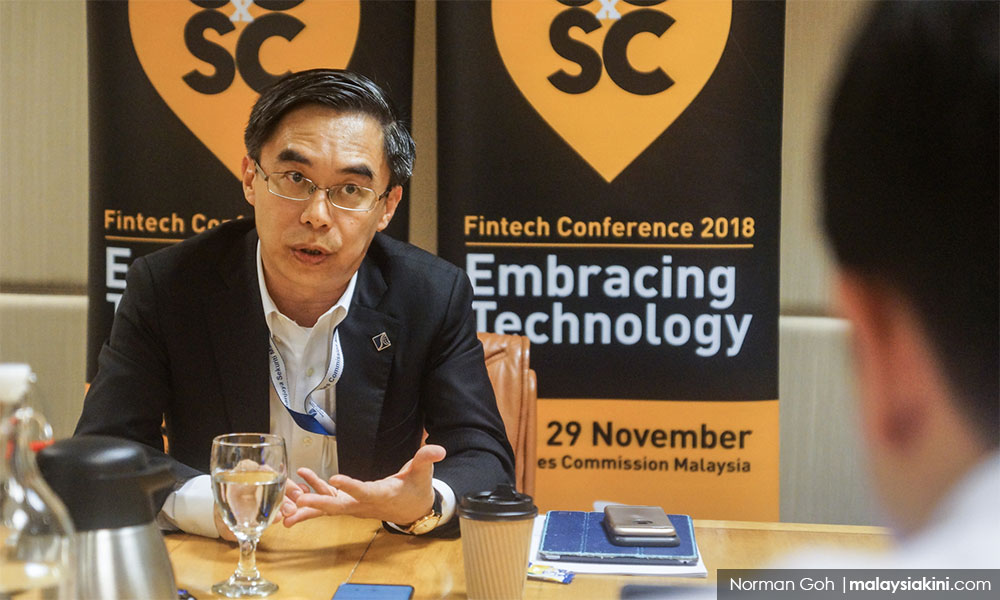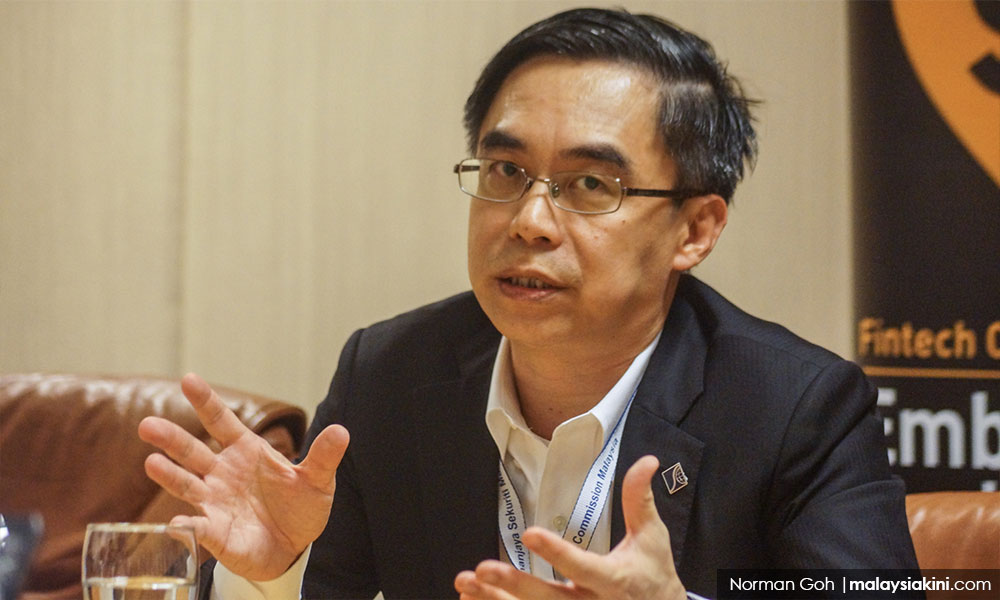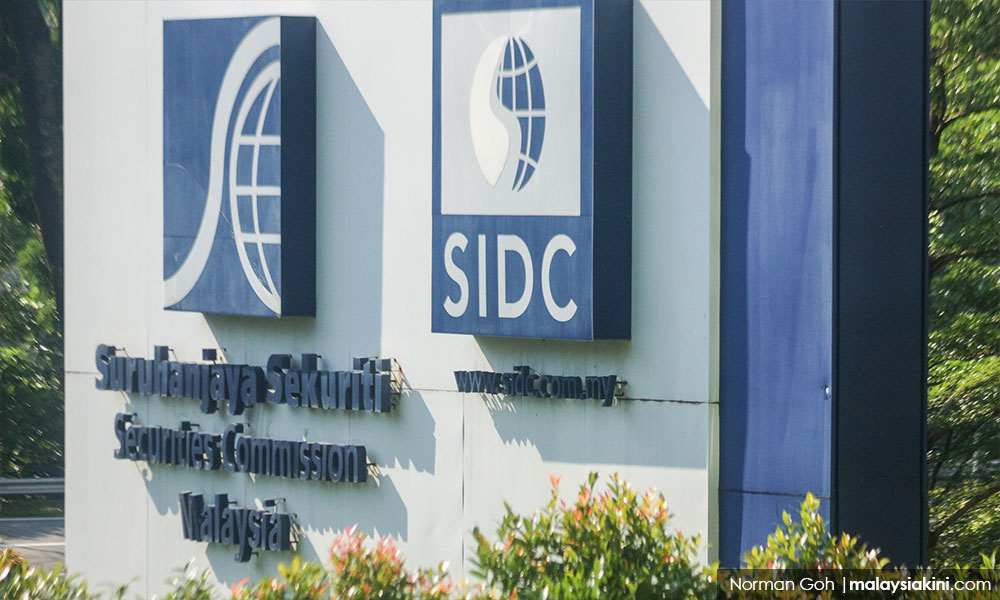In its maiden fiscal plan for the nation unveiled last month, the Pakatan Harapan government added a digital touch to Budget 2019 which highlights financial technology (fintech) such as peer-to-peer funding and cryptocurrency.
These concepts were alien to most Malaysians in the past, but had now gained traction, thanks in part to the Securities Commission's (SC) efforts to embrace such technologies and make them accessible to mom-and-pop investors.
Due to the SC's digital drive, platforms such as equity crowdfunding, peer-to-peer funding, digital brokerage and most recently robo-advisers, have become available to ordinary Malaysians within just three years.
In an interview with Malaysiakini, SC's Innovation, Digital and Strategy Department executive director Chin Wei Min said the new fintech platforms have not only provided more asset class options to retail investors but also raised funding for small and medium enterprises (SMEs).
"Collectively, in equity crowdfunding and peer-to-peer crowdfunding, we have raised more than RM200 million in a short span of time, helping to close around 500 (funding) for micro and SMEs.
"To date, there are about 9,000 investors and if you look at the statistics, more than 50 percent of the investors are aged 35 and below... In comparison, the average age of investors in stocks and unit trusts is 47," said Chin, whose department was set up just two years ago.
Building on the current progress, the SC will be organising its two-day SCxSC Fintech Conference 2018 beginning Wednesday (Nov 28).

Here's a look at what platforms are now available as a result of the SC's initiatives and what are to come:
Equity crowdfunding
In 2015, Malaysia became the first country in Asean to unveil a regulatory framework to facilitate equity crowdfunding and it took off with six platform operators the following year.
Equity crowdfunding allows investors to purchase a stake in upcoming enterprises.
Such investment is not without risk as some enterprises may be unsuccessful but successful ones will see the value of investors' stake grow.
To protect investors, the SC sets a maximum amount investors can put into any enterprise to ensure diversification.
Going forward, the SC is looking to leverage this platform to ensure that government grants to such enterprises are more transparent through a co-investment fund, which was also announced in Budget 2019.
"Of no fault of anybody, there are a few inefficiencies in the current process... If the government wants to help the SME, it may not have the experience in all sectors.
"It is typically hard to judge what is good and what is bad... The idea for co-investment is if a company can successfully convince the investing public to raise this amount of money (through equity crowdfunding), then the government will match a certain ratio," said Chin.
Peer-to-peer crowdfunding
Similar to equity crowdfunding, investors contribute money to a company but instead of receiving shares, the money is given in the form of a loan and repaid to investors with interest.
In simple words, it is like retail investors taking on the role of banks.
While banks face the problem of non-performing loans, they still make enough profit through loan interest. The same applies in peer-to-peer crowdfunding.
To protect investors and ensure diversification, the SC has set a limit on the amount retail investors can put into any one investment note.
Several approved operators launched their platforms in 2017 after the peer-to-peer crowdfunding regulatory framework was unveiled by the SC in 2016.
Robo-advisers
Described as "digital investment management" by the SC but known to the layman as "robo-advisers", the commission unveiled the framework last year and the first licence was issued earlier this month.
Robo-advisers can customise investment portfolios for retail investors across various international asset classes including exchange-traded funds (ETF), bonds, fixed income and commodities.
Such services, once only accessible to the wealthy, are now available to mom-and-pop investors with as little as RM100.

"Our three key factors are convenience, accessibility and affordability.
"A lot of working people like you and I, after putting the kids to bed at night, (have) no simple way to invest... All of us are not rich enough to have a relationship manager to ask for a special portfolio.
"So this is an area where we want to use digital means to allow investment in specific portfolios based on one's risk profile," said Chin.
Chin added that the SC was processing the application of more robo-adviser applicants, adding that there were "quite a good number in the pipeline".
He said unlike traditional fund houses which could have up to 20 employees in the back office alone, robo-advisers can operate with between seven and 15 people due to automation. This ensures low fees for investors.
Robo-advisers, as well as equity and peer-to-peer crowdfunding operators, are not allowed to directly hold investors' money as they must be kept in a special trust account, another area which the SC has been developing to ensure sufficient trust providers.
Other initiatives
In the two years since SC's Innovation, Digital and Strategy Department was set up, it has also overseen the introduction of digital brokerage and liberalise access to retail investors wanting to invest in bonds.
On the digital brokerage front, investors can now participate in the stock market without the need of a remisier as the entire process, from account opening to trading, can be done digitally.
Chin said the SC also introduced its retail bond framework in September which now allows retail investors to put their money in bonds, which was previously limited to high net worth individuals with at least RM250,000.
However, to protect investors, the SC said only AA rated bonds or better will be open to retail investors.
This was on top of the bond/sukuk information exchange the SC launched last year to provide investors with detailed information before they decide on investing in any one of them.
Looking ahead
In Budget 2019, Finance Minister Lim Guan Eng announced a peer-to-peer property crowdfunding platform as well as a digital coin and token exchange.
Chin said the SC will study the proposals, engage stakeholders and formulate a framework by next year.

He added that the SC will also be pushing financial institutions to adopt blockchain technology, thus its emphasis on technology during the two-day SCxSC Fintech Conference 2018.
Themed 'embracing technology', the SC is set to unveil a blueprint on how financial institutions can implement blockchain technology to promote transparency.
"This is the fifth year we are organising the fintech conference, the last four have been about 'fin' (financial) but this year will be more on the 'tech' as it is consistent with what we want to do," he said.
Among others, the conference will look at the implementation of artificial intelligence (AI) and cybersecurity. Already, AI has been used on the above platforms for identity verification purposes, doing away with laborious forms in conventional verification.
There will also be sessions on implementing blockchain with proof of concept by the SC.
"We will also have an investor day where entrepreneurs will make pitches - no different from equity crowdfunding raising money.
"It is a lively session and this year will probably be a bit special... We think we have curated a fair bit of experts to share their experience and we will encourage people to turn up to listen," he said.

